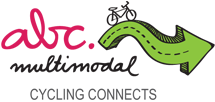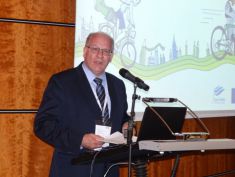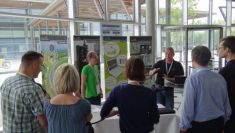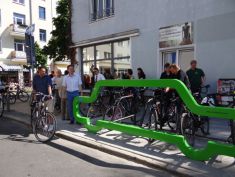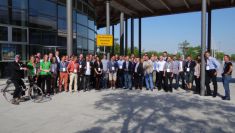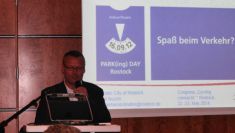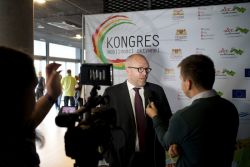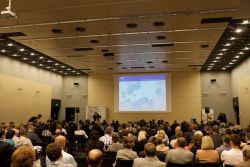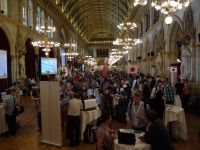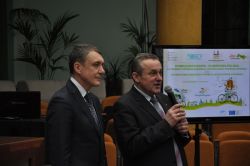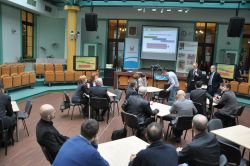CYCLING CONNECTS – CONFERENCE 2014
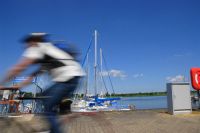
22nd - 23rd of May 2014 in Rostock, Germany
The Hanseatic City of Rostock and the Ministry of Energy, Infrastructure and Regional Development Mecklenburg-Vorpommern jointly organized the conference "Cycling promotion in the South Baltic and beyond". 20 speakers from five countries contributed with their expertise and practical experience to the two-day program. Titled “Cycling connects”, the thematic focus was put on communication and cooperation. All presentations were simultaneously translated into German and English.
About 100 representatives from governments, associations and planning offices, as well as politicians and experts joined the conference.
The conference gave the opportunity to exchange ideas with speakers and colleagues and to talk about possible collaborations and new projects. For this purpose the program also offered an evening event at the Baltic beach, a joint bike ride through Rostock and a small exhibition.
You can find the detailed program as a pdf-document here. All presentations are available here:
1st Conference Day: Thursday, 22nd of May 2014
Welcome and Opening
Moderation: Michael Fengler, Journalist
Greetings
Mayor Roland Methling
Part I – Cooperation and success
Cycling connects – factor of success: communication
Karl Reiter, FGM AMOR, Graz
Cycling City Munich – how the Bavarian capital has changed
Hep Monatzeder, Mayor Munich
Part 1 - Part 2 - Part 3
Part II – Funding at European, national and inter-regional level
European transport policy for bicycles and the „Iron Curtain Trail“
Michael Cramer, Member of the European Parliament
Cycling Nation Germany - The National Cycling Plan 2020
Niels Hartwig, Federal Ministry of Transport and Digital Infrastructure
Connecting people across borders – Sustainable Mobility under the South Baltic Programme 2014-2020
Thorsten Kohlisch & Igor Kaniecki, Joint Technical Secretariat South Baltic Programme
Part III – The project abc.multimodal: Partner cities introduce themselves
Bicycle Capital Gdansk - climber in Europe, pioneer in Poland
Krzysztof Perycz-Szczepański, City of Gdansk
Kalmar Cycling City
Patricia Vildanfors, Member of City Council Kalmar
Rostock is getting on – the development of the cycling-friendly Hanseatic City
Holger Matthäus, Senator for Construction and Environment
The project abc.multimodal – from the Kalmar Declaration until today
Thomas Möller, radplan nordost
Part IV – Ambitions and potentials
Aarhus Cycling City - High ambitions for more cycling
Pablo Celis, City of Aarhus
Part 1 - Part 2
Cycling tourism potentials in Sweden and the Baltic Sea Region
Patrick Leijon, Europe Direct Southeast Skåne
2nd Conference Day: Friday, 23rd of May 2014
Welcome and Opening
Moderation: Michael Fengler, Journalist
Greetings
Christian Pegel, Minister for Energy, Infrastructure and Development, Mecklenburg-Vorpommern
Part I – Regional cooperation for cycling promotion
The integrated traffic plan and cycling promotion in Mecklenburg-Vorpommern
Dr. Reinhard Wulfhorst, Ministry for Energy, Infrastructure and Development Mecklenburg-Vorpommern
How cooperation succeeds – The Association of Cycling-Friendly Communities (AGFK) in Bavaria
Hep Monatzeder, AGFK Bayern
Cooperation for cycling promotion in car oriented countries
Andrzej B. Piotrowicz, Polish Union of Active Mobility (PUMA)
CITY CYCLING – a campaign of 200 municipalities and the example of Rostock
André Muno, Climate Alliance & Ilona Hartmann, Hanseatic City of Rostock
Part II – Cycling promotion in practice
abc.multimodal - Implementation in Rostock
Steffen Nozon, mobility coordinator of the Hanseatic City of Rostock
Current cycle network planning in the region of Rostock
Matthias Plehn & Barbara Jatzlauk, Rostock Regional Planning Office
Pedelecs as mobile connection to public transport - the pilot project ELROS
Janette Heidenreich, Rostocker Straßenbahn AG (RSAG)
Greifswald – The city with the highest modal split of cycling
Gerhard Imhorst, University town and Hanseatic City of Greifswald
Part III - Become familiar with topics and partners
World Café
3 moderated tables á 20 min, accompanied by a conference-exhibition
a) cargo bikes & pedelecs
b) Monitoring / cycle counting
c) Bicycle parking
Moderation: ADFC Mecklenburg-Vorpommern
Meeting for municipal representatives
to talk about possible future collaborations and EU-projects
Moderation: Thomas Möller, radplan nordost
A report, the program and more presentations in German are available at: www.radregion-rostock.de.
Gdansk: 4th Congress of Active Mobility in 2013
To promote, disseminate, and exchange ideas and good experiences with maintaining a high quality of life by improving active mobility like cycling and walking, was the main idea behind the Fourth Congress of Active Mobility. The event was hosted at Gdansk's Amber Expo Exhibition and Convention Centre on September 12th and 13th.
The Congress, which has become an established event for representatives of administration, politics, initiatives, and experts in related areas attracted over three hundred participants this year. Speakers from Denmark, the Netherlands, Bulgaria, and France provided insights into different approaches to urban planning.
Several panel sessions and a technical excursion fostered an intensive exchange among the participants. Besides, the event was accompanied by a public e-bike-festival.
The Congress was jointly organised by the City of Gdansk and the Polish Union of Active Mobility (PUMA) and co-financed by the abc-multimodal project realized within the framework of the South Baltic Programme of the EU. Find more information about the congress here: http://www.kongresmobilnosci.pl
"Cycling in Central and Eastern Europe" conference
abc.multimodal at "Cycling in Central and Eastern Europe" conference in Ljubljana, Slovenia
Within the Mobile2020 project a consortium of institutions of Central and Eastern Europe has invited abc-partners from the City of Gdansk to the cycling conference in October 2013 in order to discuss issues related to cycling promotion. The audience consisted of transport and cycling professionals, decision makers, urban planners and cycling NGOs activists.
The presentation from Gdansk mainly focused on the promotion of multimodal transport. To change the public attitude with respect to cycling is a challenge given that Gdansk is a large and hilly city with diverse weather conditions. That said, the strategy of creating a “short distance city” is recognized to serve the need to counter a current trend: that of housing estates expanding into the, which forces its residents to commute to the city centre.
The city attracts many commuters from outside the municipality. Therefore multimodality seems to address every day transport needs of both commuters and residents who travel to distant destinations. A further focus of the presentation was thus the role of cycling in a multimodal system and the cycling lifestyle in Gdansk region.
Moreover, conference participants were provided with a general overview of the cycling policy in Gdansk, information on cycling promotion, as well as with examples of soft and hard measures facilitating cycling and multimodal transport. The presentation also emphasized how important it was to develop a relationship with the media in order to promote sustainable mobility, including cycling, and to encourage respect amongst road users.
The abc.multimodal project was also presented at the project market during the second day of the conference. More information on the conference can be found on:
http://www.mobile2020.eu/get-connected/lju-conference.html#sthash.UO2kSkix.dpuf
ABC AT VELO-CITY CONFERENCE 2013 IN VIENNA
In a lightning talk Steffen Nozon and Thomas Möller presented the ABC-project and its approach to launch marketing concepts and campaigns to promote cycling. Velo-city conference in Vienna was the world's biggest cycling policy conference with 1,400 participants.
You can find the presentation here.
Conference „Cycling Europe – Cycling Poland"
On 11th and 12th December 2012 the Polish Union of Active Mobility (PUMA) organised two conferences which were intended to build the awareness of the role of bicycle as a daily transport mode and transfer of knowledge about cycling promotion:
The Conference „Cycling Europe – Cycling Poland – Instruments of sustainable, integral development of the region” and the LifeCycle+ project knowledge transfer workshop +
The two meetings were attended together by over 70 representatives of local self-governments and local working groups from the świętokrzyskie and poznańskie voivodships, concerned with the improvement of conditions and the increase of the level of cycling in daily life of residents of Polish towns, cities and communes.
The main idea of the conference was to present the advantages of different forms of active mobility (with particular stress put on cycling) for regional development in a systematic way. This initiative was closely connected with the preparation of Polish self-governments to effectively use the EU funds in the years 2014-2020, within the framework of projects implemented in international consortia.
The conference was co-financed from the resources of the ABC multimodal project.
A presentation entitled „Cycling policy – an integral element of sustainable development of a region” introducing the main topic of the conference was delivered by Dr Piotr Kuropatwiński, vice-president of the European Cyclists’ Federation (ECF).
Maciej Lisicki – Deputy President of the City of Gdansk made the audience acquainted with the concept of sustainable development of urban transport systems with the City of Gdańsk as an example..
Rafał Glazik – Marketing Director of the Polish Union of Active Mobility (PUMA) presented a vision of the PUMA association in a presentation „PUMA – the lever of cooperation of Polish self-governments in the process of implementation of sustainable mobility”, on the background of projects funded from extra structural funds such as the ABC Multimodal.
At the end of the introductory, theoretical part of the conference the participants were shown a film from the 3rd Congress of Active Mobility, which is also available at the website: www.kongresmobilnosci.pl . It is worth to add that the 4th edition of the Congress, scheduled to be held on 12th and 13th September 2013 in Gdańsk, will be devoted to these issues and will be organised within the framework of the ABC Multimodal project – feel invited to take part in it.
In the second – workshop block of the conference Dr Randy Rzewnicki, from the European Cyclists Federation (ECF - Belgium), presented the experience gained during the realisation of the LifeCycle project (www.lifecycle.cc), aimed at the promotion of cycling throughout the life.
The participants of the workshop were divided into small groups made of 2-3 persons each, which used the material presented by the facilitator of the workshop. Then they had the opportunity to work, think and talk among themselves for about 2/3 of the total time, creating together an action plan. The participants were invited to present their ideas and plans during the discussion. Each group developed a draft or a preliminary project of a set of activities promoting cycling addressed to a selected target group.
Congress of Active Mobility in Gdansk 2012
Over three hundred participants took part in the Third Congress of Active Mobility in Gdansk’s AmberExpo Exhibition and Convention Centre on 6-7th September. This year’s edition of the Congress, organised by the City of Gdansk and the Polish Union of Active Mobility (PUMA), was partially financed from the Central MeetBike project implemented through the CENTRAL EUROPE program, co-financed by ERDF.
The annual congress is already well recognized as a platform to exchange new ideas and the sustainable development best practice and as such is the biggest event in Poland.
The speakers from all cross Europe shared experience on creating and sustaining cycling-friendly cities and improving the quality of life for its residents. The two days schedule also included presentations from this year’s Velocity Global cycling planning conference in Vancouver, Canada. For instance Philip Darnton from Cycling England presented the outcomes of the 250 m pounds worth programme implemented in the UK cycling towns 2005/2011.
Among those, who accepted the invitations, was Hep Monatzeder, the Deputy Mayor of Munich, where bicycle traffic has increased by about 70% within 9 years. He presented the outcomes of the “Munich – Cycling Capital of Germany” campaign. Dr Paul Marcel Kurpershoek, the ambassador of the Netherlands in Poland, explained the change in traffic attitudes, which made the Netherlands a cycling friendly country. The challenges of implementing the bicycle policy in car oriented cities were discussed by dr Piotr Kuropatwiński, a vice Chair of the European Cyclists’ Federation and a Gdansk citizen.
Participants took part in a cycling trip around Gdansk, having a chance to see the company bikes scheme at the City Hall of Gdansk as well as traffic solutions at the bicycle friendly Gdansk city centre (the 30 km/h zone, equal right intersections, bicycle contra lanes, pedestrian and bicycle shared zones).
Within the Congress there was also a prize for the Active Mobility Friendly Employer, won by the local office of the Polish Oil and Gas Company Capital Group as well as a contest for the most ridiculous car ride.
The full programme and presentations are available on the Congress’ website: www.kongresmobilnosci.pl.
It is planned to part finance the next year’s edition of the Congress within the abc.multimodal project and combine it with a project workshop.
Velo-city Global 2012 in Vancouver, Canada
Nearly a thousand participants attended Velo-city Global 2012, the biggest cycling conference in the world. The owners of the annual Velo-city conference series are the European Cyclists' Federation (ECF). This year’s conference inspired with a new approach to human rights, with children and cycling being the foundation of one of the conference's major themes, Empowering People and Inclusivity.
Two delegates from Gdansk, Mr. Remigiusz Kitlinski, the proxy of Mayor of Gdansk for Cycling Policy and Mr. Maciej Lisicki, Deputy Mayor of Gdansk attended the VeloCity Conference in Vancouver, Canada on 26-29 of June 2012.
The Charter of Vancouver
Vancouver Deputy Mayor Tony Tang, along with ECF President Manfred Neun, were amongst the signatories of the Charter of Vancouver on Children and Cycling on June 29, 2012 during the conference. The document outlines the important connection between children and cycling, and is inspired by the United Nations 1990 Convention on the Rights of the Child. It recognizes children's rights worldwide in the context of their ability to cycle. Consequently, cycling education should be incorporated into school curriculums and youth engagement in alternative transport planning should be promoted, as well as best practices for bike-to-school programs.
A series of presentations on day four of the conference proved that children and cycling had more in common than one might initially think e.g. Dr. Paul Tranter established the correlation between bicycle friendly environments and child friendly ones and proved that the needs of children and cyclists are not mutually exclusive. Dr Tranter confronted the misconception that cars save time, and suggested that making places child friendly could solve all the world’s problems.
Referring to the recently signed Charter of Vancouver, Gil Penalosa, Velo-city Global 2012's opening and closing master of ceremonies, summarised: “If it’s not good enough for a child, it’s not good enough.”
8-80 Cities
“If you create a city that’s good for an 8 year old and good for an 80 year old, you will create a successful city for everyone.” That’s a message given by a Gil Penalosa, not only a Velo-city master of ceremonies, but also an executive director of the 8-80 Cities, a Canadian non-profit organization dedicated to creating people oriented cities.
The mission of the organization is to become an influential advocate for transforming cities into places where people can walk, bike, access public transit and visit vibrant public places. It promotes safe infrastructure for pedestrians and cyclists, advocates to all levels of government in Canada and abroad and works at the community level to improve quality of life for all. The 8-80 Cities’ goal is to contribute to the creation of vibrant cities and healthy communities where residents live happier. As a master of ceremony Mr Penalosa made numerous references to 8-80’ ideology.
The programme, presentations and other information about the conference is available at http://www.velo-city2012.com/.
